- Home
- Michael Dobbs
WC02 - Never Surrender Page 4
WC02 - Never Surrender Read online
Page 4
"Papa, I should tell you'
But it was too late. As the match was struck there was a flash of considerable brilliance, and Lord Randolph was gone, the chair empty. The son was once more alone.
"Know mine enemies, Papa? But all I ever truly wanted to know was you .. ."
TWO
Whit Sunday. The first Sunday of the real war.
The Reverend Henry Chichester climbed into the pulpit of his ancient parish church of St. Ignatius-without-the-Walls, which stood above the port of Dover, and confronted pews that were crowded with parishioners. There was no denying it: war had been good for business. The flock grew larger with every passing month. What did it matter that these people had grabbed their gas masks and ration books before they'd given a thought to embracing religion, so long as they had ended up here?
I will have mercy, and not sacrifice: for I am not come to call the righteous, but sinners to repentance .. .
Time, he thought, was man's greatest enemy. Time passes, and time destroys. There was a time when he had been a young man brimming with self-belief and optimism, before the trenches of Flanders. There was, too, a later time when he had gathered the pieces of that lost happiness through his love for Jennie, yet God seemed unshakable in His plan that Henry Chichester's days were not to be spent in a state of contentment. Jennie had died giving birth, and had taken with her the last flakes of colour in his life. He had found many other things to fill the void duty, obligation, ritual, the son yet still it was a void. And it felt timeless, without end, a life surrounded by so many people, yet spent so much alone.
Behind his back they called him Bishop Brimstone in recognition of the strength of his faith. Henry Chichester was a good man, a strong and awe-inspiring preacher for these hard times, which is why they crowded into his pews, placed money upon the plate, filled the churchyard with flowers and left his surplice whiter than any summer cloud. All for faith. Yet none of the eager faces now raised in front of him could comprehend how, alongside his faith, sat failure. His life had been a litany of failure. He had failed in the trenches, simply by surviving. He had failed Jennie, too, by letting her die, and then failed as a father by letting Don go. He had even failed his God. The Reverend Chichester was not a wicked man but he knew he was a dishonest man, for while he preached duty as being the way to salvation he was aware that the only thing duty had delivered unto him these past years was unhappiness and a feeling that his soul had been placed on a bed of ice, where it had somehow become frozen, unable to move.
"Today Whit Sunday we celebrate a time of accomplishment," he began from the pulpit. "When men shall go forth and do great deeds."
It wasn't the standard Whit Sunday sermon, but present circumstances called for something a little different. Many years ago his college principal had told him that while the Word may be eternal, a congregation's attention span never was, so Henry Chichester had developed a reputation for his vivid sermons. But how could he inspire others when his words had long ago ceased to inspire him? He raised his eyes heavenward, but all he saw was a large patch of damp above his head that was growing steadily worse in the salt-wind storms. The roof was long overdue for repair, but what was the point when the entire building might be blown away by a single bomb? Dear God, what was the point?
"The Whit Sunday story began a little while after Our Lord's ascension into heaven, when the Apostles had come together to celebrate the day of Pentecost. They were alone, uncertain, worried about what the future held in store for them. And as they assembled in their small room, from the sky came a noise like that of a whirlwind and they were surrounded on all sides by leaping tongues of fire. Imagine that. Imagine how those men must have felt. In just a few weeks their Lord had been crucified, then resurrected, after which he had disappeared. And now this. Fire and chaos on all sides. Those poor Apostles must have been terrified." He cast his arms wide to gather in all the concerns his congregation were wearing so openly. "O Lord, how many of our young men in France must share that fear today."
They wouldn't fall asleep today. Nowhere in the country was closer to the war than this place and not a family in the town could escape it. The town was the port, and the port was the highway to a battlefield that was being fought over for the third time in seventy years. Like it or not, it was Dover's war. All the newspapers carried large maps of Flanders, and the Reverend Chichester had cut out the map from The Times and pinned it on the notice board in the porch alongside the brass-cleaning roster. Something to help focus their prayers.
"Before his ascension Jesus had told the Apostles, "I leave behind with you peace. I give you my own peace, but my gift is nothing like the peace of this world." The vicar stared over his reading glasses and repeated the words for emphasis. "Nothing like the peace of this world. Our Lord knew that peace didn't come naturally to this world; his message was that it would have to be laboured for yes, even fought for. He was telling us that the crusade for Christ might involve much hardship."
Eyes gazed up at him, the majority female, anxious, all desperate for reassurance.
"And he told us this. In his own words, Jesus said: "Let not your heart be troubled, neither let it be afraid." That's what he told the Apostles. And that is what he is telling us today."
Mrs. Parnell had seen him post up the map as she arrived for flower duty. There seemed to be more flowers this year than ever. Her eyes had brimmed as she saw what he was doing. "My youngest, Harry," she said, fighting her tears. "Just got his call-up papers this morning." She had made no complaint, simply grabbed her flowers and began cutting and arranging them with even more care than usual. It was only later he had found her sobbing in a rear pew. I know, I know' she waved away his awkward attempt to comfort her 'he's got to do his bit. But as a mother it's so ... well, you understand, of course. With your Donald."
Reverend Chichester had smiled grimly and nodded. When his son had left, his parishioners assumed that he had gone off to fight like all the rest. It was an impression his father had done nothing to dispel. It wasn't a lie, not at first, but it had taken root and grown to the point where his silence screamed of falsehood. But what was he to do? Admit the truth and lose the respect of all the Mrs. Parnells in his congregation, just at the time they needed him most?
Or lose his self-respect, by admitting that every time he looked at his son he was reminded of Jennie and everything he had lost, and acknowledging that, in spite of a lifetime of faith and duty, he still couldn't cope? He'd spent three years in a tunic constantly spattered with blood and he'd survived, yet inside he felt ... a coward. Which is why the word had sprung so easily to his lips and been hurled at his only son.
"Our young men are like the Apostles," he told them. "Sent out to follow in the footsteps of Our Lord and to cleanse the world from sin. May the Holy Spirit be with them, too."
A chorus of 'amens' rippled through the congregation. The sun shone through the south windows into the nave, filling the church with warmth and comfort. He hoped it was an omen.
"And let us take the words of Our Lord as our message today, when he said: "I am going away and I am coming back to you." Coming back to you. Jesus passed through many trials and tribulations, but he came back to us as we pray with all our hearts that our loved ones shall. May the Holy Spirit be with them, to bring them courage in all they do and victory in their task. May the Lord comfort them, keep them in His care and deliver them from evil, fortune is the kingdom, the power and the glory .. ."
As he offered the sign of the cross and bade his flock to stand for the next hymn, his mind went back to the map on the board. He'd noticed there were no battle fronts or lines of trenches marked on it, not like last time, just the outline of a chunk of northern France and Belgium. But that was understandable, he decided. The Reverend Chichester, like so many others, concluded that the BEF was probably advancing too fast for the cartographers to keep up.
The morning had burst forth most gloriously, filled with bird-song and with the aroma of fresh spring gras
s still carried on the breeze. The clouds stood high and like gauze an excellent day for cricket, Don thought, or some other game the Germans were no good at.
The old brewery in which the 6th had landed turned out to be rancid, full of pigeons and other pestilence. The task of transforming it into a Casualty Clearing Station was Herculean, and to be finished by the end of the day, they were instructed. They set about their labours with hoses and mops, encouraged by both the barks of their NCOs and the strengthening sun, while around them the local inhabitants carried on with their lives as they had always done: the milk was delivered, post collected, the children sent off to school as if war were no more than a distant rumour. And so it seemed. As the day drew on the men in Don's unit began to relax; there had still been no sign of the enemy. Perhaps Hitler had thought better of the whole idea.
The news was brought to them while they paused for their first brew of the afternoon.
"Right, then," the sergeant announced. Tack it all up again. We're moving."
"Where?"
"Back."
"But, Sarge, I don't understand, we only just got here .. ."
"If you had been meant to understand, matey, God would have made you a general instead of a bleedin' nursing orderly. So let's just agree in this instance that the Almighty knows a half-sight more than you and jump to it. We move out. In an hour."
"We haven't had a single casualty," Don complained, bemused.
"And you'll be the first, Private, if you don't get off your backside .. ."
A wasted day. Grand Old Duke of York stuff. Yet Don found consolation. The fresh orders suggested there was an alternative plan. They were moving back towards the defensive positions they'd spent so long constructing. That had to make sense, so Don told the others. Only problem was, it seemed to involve so many filing cabinets once again.
The two men met in the middle of the huge walled garden. One bowed, they shook hands.
"I must confess that I have been lying in wait for you, Edward."
"Then it is my turn to confess, sir, and tell you that I fear I've been avoiding you."
They walked on, casting long evening shadows on the lawn, taking in the false sweetness of that spring. They were the two most respected men in the country, yet both victims of their birth. One was King, the other the most influential of aristocrats, and between them they represented all the powers and privileges that had kept the kingdom undiminished for a thousand years. Now it might not see out the summer.
"Why have you been avoiding me, Edward?"
"Because I fear I have let you down."
"Perhaps you have let yourself down."
"I fear that, too."
King George VI walked on in silence with Edward, the Third Viscount Halifax, at his side. The two men were far more than monarch and Foreign Minister. There was an intimacy between them, a deep friendship that extended far beyond their formal roles. They and their families dined together, went to the theatre together, sometimes prayed together, down on their knees, side by side, and Halifax had been given a key to the gardens of Buckingham Palace for his own private recreation. Two days earlier he'd also been given the opportunity of becoming Prime Minister, and only because of his own overwhelming reluctance had the office been handed to Winston Churchill. Now, as they walked, Halifax's tall, angular frame was bent low, like a penitent. A flight of ducks flew noisily above their heads, wheeling sharply in formation before crashing into the lake, where they began a noisy confrontation with the birds they had disturbed.
The ducks rather remind me," Halifax began tentatively, anxious to avoid the King's questions, 'of those poor Dutch ministers."
"The Dutch? Tell me, I've heard nothing," the King insisted anxiously. He was always concerned about keeping up with information; he found his job wretched enough without having to do it in the dark.
They were flying from Holland yesterday when they were intercepted by German fighters. They made it through, but badly damaged. Forced to ditch in the sea off Brighton. And that's where the most dangerous part of their enterprise began. They managed to swim and stumble ashore and had just fallen exhausted upon the sand, when they were surrounded by a suspicious mob and arrested by the constabulary on suspicion of being enemy spies."
"Are you serious?"
"Desperately so. By the time they arrived in my office they were in a terrible state. I told them they had set a splendid example, and were clearly invincible."
"What did they want?"
"Oh, an army."
"Pity. Brave souls."
"I've just seen their ambassador you know him I think, van Verduynen. Assured me that the Dutch will resist with the same stubbornness and perseverance they have always shown."
"Without an army," the King added softly.
"The Belgian ambassador assures me of victory. Says they are ten times stronger than in 1914."
"And they have our prayers."
"Not forgetting our own Expeditionary Force," Halifax added a trifle too quickly, missing the irony.
The conversation was proving difficult, and at first Halifax was relieved when they were diverted by the arrival of the Queen, Elizabeth. Halifax responded to her warm smile by kissing her hand and enquiring after the children, but he was to find no relaxation on this occasion.
"Edward," the Queen began, 'we are so disappointed."
The Minister stooped once more. "I'm a little mystified myself. It's not easy to explain but ... I thought I think that Winston's temperament, however unreliable and impetuous, may be better suited for this particular moment than perhaps is mine."
"You don't sound terribly certain of it," the King commented.
"I'm not. Certainty is a luxury at times like these. But think of it this way, if I were Prime Minister I would have Winston prowling up and down outside Downing Street. You know how much damage he can cause when things go to his head. So better the tiger inside the cage."
"With you holding the key."
"Yes, something like that."
"Until he has been either tamed or trampled by events," the Queen added. "Nothing lasts for ever in this chaotic world, Edward. Your turn will come."
Halifax nodded diffidently in the manner of all Englishmen confronted by their own ambition.
"Oh, Winston!" Elizabeth uttered the name in exasperation, and without affection. "He will cause problems, you know he will. Always has."
"And already is," Halifax responded. "Wants Beaverbrook back."
"What?" Elizabeth exclaimed. She neither liked nor trusted Max Beaverbrook, a Canadian emigre who had spent a long life charting a career through some exceptionally murky waters. He had been a Cabinet Minister during the last war, was now a peer and the immensely powerful owner of the Express newspaper group, and would for ever be an incorrigible conspirator. In his time he had schemed against both Churchill and the present Royal Family; it appeared that Churchill was far more ready to forgive him than was the Queen.
"Wants to put him in charge of aircraft production," Halifax added for detail.
"He.must be stopped," Elizabeth insisted. "Beaverbrook is incapable of responsibility. Remember .. ." She waved her hand in exasperation. There was so much to remember from Beaverbrook's long career, not least his unflagging public support for her despicable brother-in-law, the abdicated Edward.
The King, less voluble, was nevertheless shaking his head. "No, no, it won't do. I must write to Winston immediately."
"Yes, hobble his horse," the Queen insisted.
Halifax swallowed deep, calculating. Should he mention the other matter? But he was exhausted by the events of the last few days and no longer trusted his own judgement. Instead he allowed base instinct to rule and to stir the Prime Minister's pot.
"He also wants Bracken as a Privy Councillor."
"No!" Elizabeth once more led the objections, more vehement than ever. "Bracken as part of the King's own private council? That we cannot have." Membership of the Council was an exceptional honour reserved for the
most senior in the land, not a jumped-up Irish adventurer. She hooked her arm through her husband's and clasped him tightly, as if they both required an extra measure of support. "Those men around Mr. Churchill," she exclaimed, 'are not gentlemen."
"I fear the government is being given over to gangsters," Halifax muttered miserably. He knew that both the King and Queen believed it to be largely his fault.
They wandered on in silence, skirting the lake, passing beyond rhododendrons that were raising flower-drenched branches in seasonal triumph, until Elizabeth turned to her husband, as always wishing to share his burden when he appeared distressed. "A penny for those thoughts of yours, my dear."
The King seemed startled for a moment, dragged back from distant troubles. "I was thinking, well .. . like you, how very much I had wanted Edward for the job. And then worrying just a little how can I put it? About us and the Germans. That our gangsters may not be as good as theirs."
It was beyond midnight when Churchill's private detective, Inspector Thompson, ushered the woman into Churchill's study. Churchill was busy writing a letter and didn't look up. Without being asked, Thompson refilled his master's glass, then offered a drink to the woman. With a curt shake of the head, she declined. Thompson left, closing the door behind quietly him.
Only then did Churchill raise his eyes.
"Didn't know if you would come."
"Didn't want to. But your private policeman waved his warrant card. You know we Germans are helpless in the face of authority."
Ruth Mueller was around fifty with a thin, elegant face that had worn well and fading blonde hair trimmed severely at the neck. She had probably cut it herself. There were other signs of self-reliance about her, apart from defiant eyes her tweed suit was frayed at the cuffs and clearly designed for someone several pounds heavier, her shoes were old, her fingers unadorned by ny jewellery. She held an ancient handbag protectively in her lap.

 Last Man to Die
Last Man to Die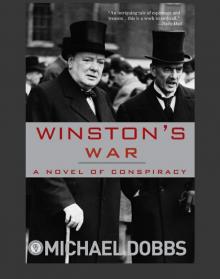 Winston's War
Winston's War The House of Cards Complete Trilogy
The House of Cards Complete Trilogy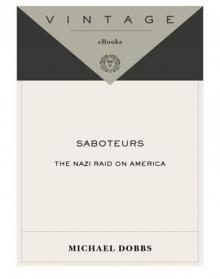 Saboteurs
Saboteurs The Touch of Innocents
The Touch of Innocents WC02 - Never Surrender
WC02 - Never Surrender Old Enemies
Old Enemies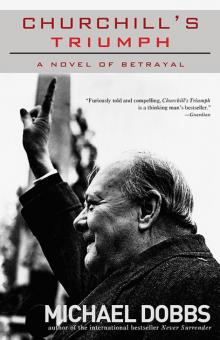 Churchill's Triumph
Churchill's Triumph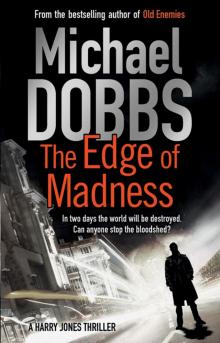 The Edge of Madness
The Edge of Madness Goodfellowe MP
Goodfellowe MP The Final Cut
The Final Cut Whispers of Betrayal
Whispers of Betrayal Churchill's Hour
Churchill's Hour The Buddha of Brewer Street
The Buddha of Brewer Street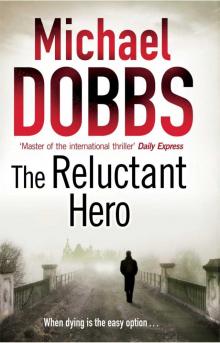 The Reluctant Hero
The Reluctant Hero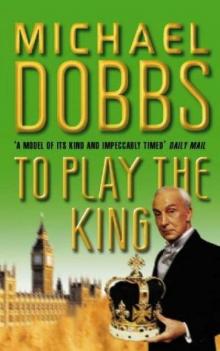 To Play the King
To Play the King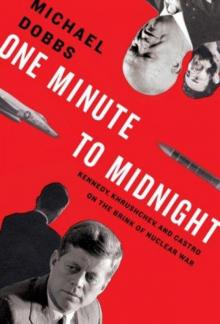 One minute to midnight
One minute to midnight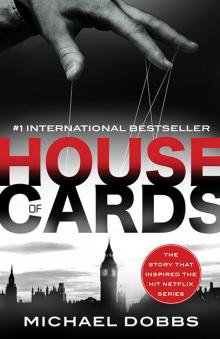 House of Cards
House of Cards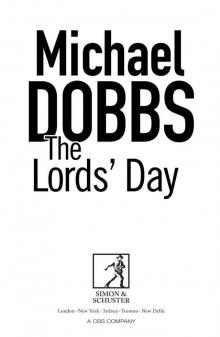 The Lords' Day (retail)
The Lords' Day (retail)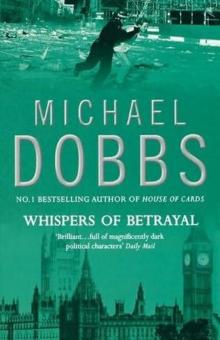 Whispers of betrayal tg-3
Whispers of betrayal tg-3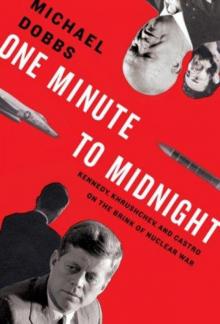 One minute to midnight: Kennedy, Khrushchev, and Castro on the brink of nuclear war
One minute to midnight: Kennedy, Khrushchev, and Castro on the brink of nuclear war The Final Cut fu-3
The Final Cut fu-3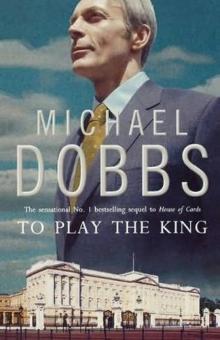 To play the king fu-2
To play the king fu-2 A Ghost at the Door
A Ghost at the Door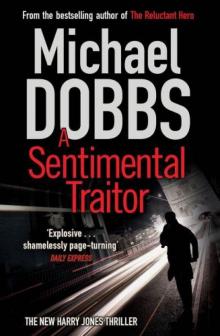 A Sentimental Traitor
A Sentimental Traitor